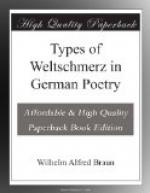Radestock, in his study “Genie und Wahnsinn,” mentions and elaborates among others the following points of resemblance between the mind of genius and the insane mind: an abnormal activity of the imagination, very rapid succession of ideas, extreme concentration of thought upon a single subject or idea, and lastly, what would seem the cardinal point, a weakness of will-energy, the lack of that force which alone can serve to bring under control all these other unruly elements and give balance to what must otherwise be an extremely one-sided mechanism. Here again the exception may be taken to prove the rule. It is not too much, I think, to assert that Goethe could never have become so uniquely great, not even through the splendid versatility of his genius, but for that incomparable self-control, which he made the watchword of his life. And in the case of the poet of Weltschmerz the presence or absence of this quality may even decide whether he shall rise superior to his beclouded condition or perish in the gloom. The conclusion at which Radestock arrives is that genius, as the expression of the most intense mental activity, occupies the middle ground, as it were, between the normal healthy state on the one hand, and the abnormal, pathological state on the other, and has without doubt many points of contact with mental disease; and that although the elements which genius has in common with insanity may not be strong enough in themselves to induce the transition from the former to the latter state, yet when other aggravating causes are added, such as physical disease, violent emotions or passions, overwork, the pressure or distress of outward circumstances, the highly gifted individual is much more liable to cross the line of demarkation between the two mental states than is the average mind, which is more remote from that line. If this can be asserted of genius in general, it must be even more particularly and widely applicable in reference to a combination of genius and Weltschmerz. We shall find pathetic examples in the first two types selected for examination.
Having thus introduced the subject in its most general bearings and aspects, it remains for us to review briefly its historical background.
Weltschmerz is essentially a symptom of a period of conflict, of transition. The powerful reaction which marks the eighteenth century—a reaction against all traditional intellectual authority, and a struggle for the emancipation of the individual, of research, of inspiration and of genius—reached its high-water mark in Germany in the seventies. But with the unrestrained outbursts of the champions of Storm and Stress the problem was by no means solved; there remained the basic conflict between the idea of personal liberty and the strait-jacket of Frederician absolutism, the conflict between the dynastic and the national idea of the state. Should the individual yield a blind, unreasoned submission to the state as to a divinely instituted arbitrary authority, good




